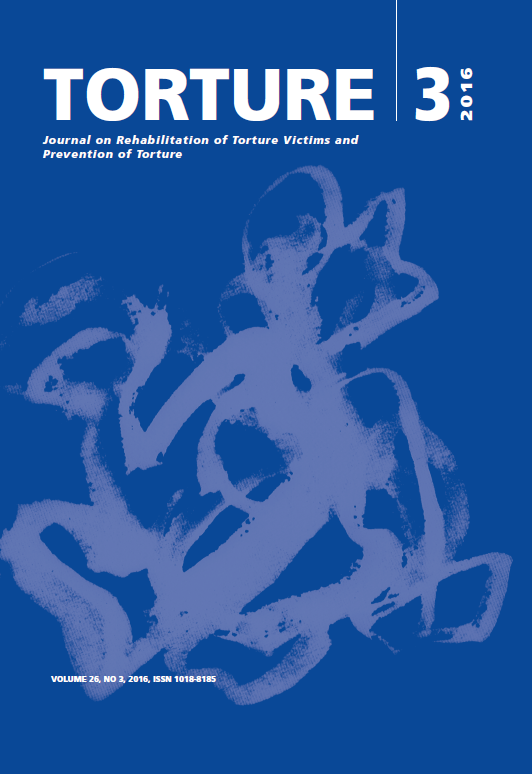Incommunicado detention and torture in Spain, Part I: The Istanbul Protocol Project in the Basque Country
Istanbul Protocol Project in the Basque Country Working Group
DOI:
https://doi.org/10.7146/torture.v26i3.109329Palabras clave:
Istanbul Protocol, torture, ill-treatment, documentation of torture, Spain, consequences of torture, incommunicado detaineesResumen
There is increasing evidence to show that torture is a serious problem in the Basque Country. Whilst such evidence can be found in reports of international human rights monitoring bodies, sentences of Spanish and international courts, and empirical studies, they are limited in not having followed the Istanbul Protocol (IP) in order to evaluate the reliability of torture. A working group composed of professional associations of psychiatrists, psychologists, physicians, and lawyers, in collaboration with the University of the Basque Country, conducted a four-year study on the medical and psychological consequences of torture in incommunicado detainees, including an assessment of credibility in line with the IP. The methodological design included a multi-level peer-reviewed blind assessment and input by an external expert (from the Independent Forensic Expert Group facilitated by the International Rehabilitation Council for Torture Victims (IRCT)). A sample of 45 Basque people held in short-term incommunicado detention under anti-terrorist legislation (between 1980 and 2012) in Spain who had reported ill-treatment or torture was selected.
The findings are divided into four papers: the present introductory paper; the second analyses the credibility of the allegations of torture and introduces an innovative methodology that enhances the IP, the Standardized Evaluation Form (SEC); the third provides an analysis of the methods of torture and introduces the concept of Torturing Environments; and, in the last paper, the psychological and psychiatric consequences of incommunicado detention are analyzed. The collection of papers are intended to be useful not only in the documentation of torture in the Basque Country and Spain but also as an innovative example of how the IP can be used for research purposes.
Citas
2. United Nations Committee against Torture (CAT): Spain. 23 December 2002, CAT/C/ CR/29/3.
3. United Nations Report of the Special Rapporteur on the question of torture: Visit to Spain. 6 February 2004, E/CN.4/2004/56/Add.2.
4. United Nations Human Rights Committee. María Cruz Achabal Puertas v. Spain, Communication No. 1945/2010, U.N. Doc. CCPR/ C/107/D/1945/2010 (2013).
5. European Committee for the Prevention of Torture (CPT). Special recommendations after the visit of May 30 to June 13, 2011. Available from: http://www.cpt.coe.int/documents/ esp/2013-06-inf-esp.pdf. See also all other reports on Spain available from: http://www.cpt. coe.int/).
6. Sentencia de la Audiencia Nacional de 12 abril de 2010 relativa al denominado “Caso Egunkaria”. Audiencia Nacional, Sala de lo Penal Sección Primera SENTENCIA Núm. 27/2010. Available from: http://www.berria.eus/dokumentuak/dokumentua599.pdf
7. Sentencia del Tribunal Supremo 483/2011, de 30 de mayo, que revisa en casación un supuesto de colaboración con organización terrorista del año 2009.
8. Tribunal Constitucional (STC 63/2010, de 18 de octubre de 2010). Available from: https:// www.boe.es/diario_boe/txt.php?id=BOEA-2010-17740
9. European Court of Human Rights. Beortegui Martinez v. Spain (no. 36286/14). 31 May 2016.
10. United Nations Committee against Torture (CAT). Communication no. 453/2011. Decision adopted by the Committee at its 48th session, 7 May to 1 June 2012.
11. Arzuaga, Julen, Oso Latza izan da. Tortura Euskal Herrian. [It has been so tough. Torture in the Basque Country] Euskal Memoria, DonostiaSan Sebastian; 2012.
12. Basque Government, Presidency. “Informe-base de vulneraciones de derechos humanos en el caso vasco (1960-2013)” [Base-Report of Human Rights Violations in the Basque Country (19602013)]. Vitoria-Gasteiz, 2013; June.
13. Human Rights Department. Torture: a scientific approach (2000-2008). Basque Government, Vitoria-Gasteiz; 2009.
14. Basque Government, Presidency. Lehendakaritza, Secretaría General de Paz y Convivencia. Plan de paz y convivencia 2013-16 [Peace and Coexistence Plan] Gobierno Vasco, June; 2013.
15. Instituto Vasco de Criminología. Proyecto de investigación de la tortura en Euskadi entre 1960-2010: Informe preliminar sobre diseño y primeros pasos del estudio sobre la tortura. Donosti 2015. Available from: http://www.nuevatribuna.es/media/nuevatribuna/files/2015/06/26/informe_estudio_tortura_parlamento_vasco.pdf).
16. Spanish Government answer to CPT ON the Report on its visit dated September 9th to October 1st 2007: CPT/Inf (2011) 12. Available from: http://www.cpt.coe.int/documents/esp/2013-06inf-eng.htm
17. Argituz, AEN, Ekimen Elkartea, GAC, JaikiHadi, OME, OSALDE, Departamento de Psicología Social (UPV/EHU). Incommunicado detention and torture. Assessments using the Istanbul protocol. Bilbao: Ekimen Ed. and Irredentos Libros; 2014. Available from: HTTP:// www.psicosocial.net/images/Tortura/InformeIncomunicacion-torture-Analisis-protocoloEstambul-Eng.pdf, or can be requested from the corresponding author.
Descargas
Publicado
Cómo citar
Número
Sección
Licencia
We accept that some authors (e.g. government employees in some countries) are unable to transfer copyright. The Creative Commons Licence Attribution-NonCommercial-NoDerivatives 4.0 International (CC BY-NC-ND 4.0) covers both the Torture Journal and the IRCT web site. The publisher will not put any limitation on the personal freedom of the author to use material contained in the paper in other works which may be published, provided that acknowledgement is made to the original place of publication.


